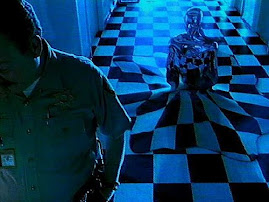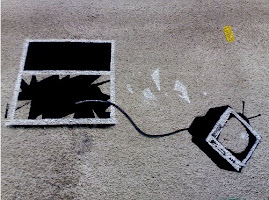.
Seeing How Wrong They WereI don’t really believe in karma. My personal cosmology is based on random chance. My universe popped suddenly into being out of nothingness. This occurred in an unexpected instance of startling cosmic eloquence we call the
big bang. It then evolved, along it's own celestial timeline, into that paradoxical confluence of the infinitesimally minute and the immeasurably vast. The place in which a bewildered humanity is forever destined to live out the moments of its brief lives. But the curiousness of how perfectly events unfolded to favor
life, consciousness and
intelligence is another matter altogether. The fact that it happened at all on this one tiny grain of sand, adrift in an unimaginable, and -- so far -- otherwise lifeless void has not eluded me. Nor has the improbable rarity that on our earth we have the exact conditions necessary for the evolution of life. And that it did happen in just the way it did -- in a universe where even the exact conditions necessary for things as basic as matter and gravity were a tenuous proposition at best. Now, that is something to ponder. But not in the way creationists ponder
William Paley's self-evolving clock. I’m not looking for proofs of some divine counterpart to ourselves, busy in her laboratory whipping up flask after flask of parallel universes filled with little creatures, made in her own image, to “know, love and serve” her.
Even the notion of a
biocentric universe, where we are just, in reality, a sort of floating brain in space becoming increasingly self aware as consciousness evolves as a part of our physical reality is, while interesting, speculative almost to the point of irrelevance, if not absurdity. So, like the Greeks before me, I don’t know why I’m here. In fact, I don’t believe there is even a reason why. All the reasons history and religion have given us have long since proven to be based on hubris and plain human arrogance. And I refuse to create a celestial sphere with planets and stars hung from it’s walls with crazy glue, as they did. Not because I’m smarter. But because my perch in history gives me the privilege of seeing how wrong they were.
The Pursuit of Social Justice and the Laws of ThermodynamicsAnd yet, in the beauty of mathematics; in the symmetry of Euclid’s two dimensional geometry, and even in the extraordinary, endlessly recurring proliferation of things in
Mandelbrot’s fractal geometry, I can’t help but wonder if karma is itself some sort of inevitable physical reality. One that ultimately brings all things into a kind of cosmic balance. Where one finally finds a pattern to life’s craziness that makes it seem, if not normal, at least acceptably typical. One that lays those disturbing irregular and random bits and pieces of everyday life over with a blanket of recognizable, reassuring, recurring regularity. One that can provide that missing link between notions as diverse as the pursuit of social justice and the laws of
thermodynamics.
And for the sake of continuing this metaphorical line of thought, I’m going to take a stab at imagining what that link would look like. Doing so requires the willingness to intellectually “trip the light fantastic” to some degree. It requires a departure from even the illusion of science and a willingness to stretch analogy like taffy to make it fit the framework of argument. So, prepare now to mentally “zoom-in” from the cosmic whole to the micro-personal, viral consciousness of the American ethnic majority in the precarious pursuit of the elusive occurrence of that stuff we call “
karma”.
This Unscholarly Hypothesis -- This Convenient Myth -- of MineKarma can’t be seen. Nor held in one’s hand. It can’t be examined directly. No telemetry exists to reach out and grab it, or manipulate it in three dimensional form so that it can be analyzed, probed, researched, subjected to trial and error experimentation or otherwise captured for one’s own personal amusement or erudition. Even it’s very existence must be inferred. It must be inferred in the same way that the existence of other multiple physical dimensions are inferred by the secondary behaviors they exhibit in imaginary structures like
hypercubes. Like people living in Flat Land we cannot experience the physical reality of karma directly. We have to deduce its existence from the behavior of familiar objects (or social institutions) that we all normally dwell in the midst of. We have to approach it in the same manner that
Johann Galle and Heinrich d'Arrest did when they embarked on their mathematical journey to discover why gravity was misbehaving in one small sector of our solar system. A journey that led to the discovery of the phantom planet they knew had to exist to explain that anomaly; which was, of course, the previously unknown planet, Neptune. It has to be approached in the same way that eventually led cosmologists to conclude that gravity itself -- that omnipresent constant of all constants -- behaves differently at the far edges of the universe than it does in the deep space of our own cosmic backyard.
There are, by this unscholarly hypothesis -- this convenient myth -- of mine, no doubt, millions of undetected sparks of karma bombarding our personal realities every second, just as there is an ongoing angry blizzard of radiation particles storming our earth continuously like pieces of hail in the fury of a relentless winter storm. And we feel their hits, even without awareness from whence they come. We feel them not only in the drift of continents, or the upheavals of tsunamis and earthquakes, or in the unexpected molestations of famine, pestilence or disease that have plagued the existence of our species from the beginning. We feel them as well in our non-physical worlds. In our mental constructs. In those social fortresses that we as a species have assembled: in our countries and nation states, in our huts and villages, in our suburbs and cities, in our religions and governments and nuclear families. We even feel them in those personal, singular, existential and visceral pockets of consciousness that constitute that state of physical reality that we describe as life itself. They are there. In the winds of war, as they brush against our faces, chilling our skin even to the bone. In the brutalities we inflict on our own kind and on the other creatures of our planet. And on the planet itself. They are there. Always there. Amid our joys, our loves, our fears, our hatreds, our compassions, our indifference, our commitments, our betrayals of those commitments. They are there in the ticker tape parades, the launching of both rockets and new cities. In the birth of new dreams and in the destruction and death of old ones. They are there at the moment of our conception and at the instant of our passing.
The Plight of the American Ethnic Majority And they are there for a reason. To restore balance in the presence of dissonance. Not only in the thermodynamic forces that determine how the physical aspects of the universe play out, but even in the playing out of the pursuit of social justice. Consider, for instance the current plight of the American ethnic majority -- the white race. For two thousand years the history of the world has been written by the hand of the white race. It has controlled those institutions of power: governments, religion, technology, social progress, capitalism, democracy and all of those major propensities of civilization that have dominated the earth. If not by argument and intellectual discourse, then by the sword. And yet, at their pinnacle of strength they have repeatedly, in our own time, surrendered that dominance, willingly, by concession. The mighty WASP of the 1950’s has lost so much of its sting. And the power of cultural dominance, which had for two hundred years percolated down from a white aristocracy to those at the bottom now increasingly bubbles upward from the bottom to the top. We see it in the physical icons of culture. In fashion, where the new wardrobes of the rich come not from the boardrooms of corporations and the wives of socialites but from the streets of inner city youth. In music, where rap and hip hop have replaced classical music as the predominant vehicle of the cultural thrust that sets in motion the drive and direction of social and intellectual change. And in art, where kids with cans of spray paint set the new standard of the Avant-garde.
Choosing Victimhood Over DominanceBut, perhaps the most startling change has been the decision of American whites to choose victimhood over dominance as the main method of achieving whatever remaining part of the white American dream that may still be had outside the covers of Time-Life books and 1950‘s television reruns. As they scratch and claw their way to minority status, both in the reality of population decline and in their own mental frame of reference, they increasingly decry the loss of white culture and white dominance to the cultural giants they fear most: affirmative action, the crumbling of evangelical Christianity, the growth of secular humanism, and the culture-wide acceptance of intellectualism over religion as a vehicle of progress. And, in attempting to recapture their depleted vitality, they have beat a path to the backwoods of talk radio, anti-intellectualism and a resurgence of racism and neo-conservative political surrender as a means to achieving those ends.
Even the Language Has Caught Up With ThemSo, it has come to past; and yes, it may indeed be a reflection of that elusive factor,
karma, that even the language has caught up with them. That even the words that spill from their mouths betray them cruelly; inflicting the unkindest cut of all. That karma has, in effect, seen to it that there is a word of compensation, a word of rhetorical revenge, set down to even the historical score between black and white. A word that dredges up all the hundreds of years of guilt that whites managed to hide under the legendary and celebrated cloth of the American Empire. But the word has stripped away that cloth as surely as it had the emperor of his “new clothes.” Karma has seen to that. Because for two hundred years there never was a word as hurtful , undeserved, hollow, or demeaning as “ nigger“. It carries absolutely no redemptive social value whatsoever. The word “ nigger“ has served as a cruel and maliciously spiteful tool against blacks for centuries. But society has a way of evolving useful new tools when there is a need for them. Now the word “racist” has picked up that utility to a great degree when applied to whites. And now, every time whites hear the word “racist” they cringe. They feel the need to justify themselves. To somehow cleanse themselves. To put distance between themselves and that charge, even when they are not particularly guilty of it. But nothing helps. They literally, viscerally feel the guilt of the “sins of the father“. The charge of racism sticks to whites -- not just in America, but the world over -- as if it were made of Velcro. Yes, it’s unfair to call all whites racists. Like the word "nigger", it triggers the same sense of self loathing, guilt, shame; the same visceral enducement of fear of failure, the need to cover up the truth -- even when the truth is innocence. It impels one to deny the undeniable. It triggers the need to deny the word itself and it's reality: that the very word “racist” is now the new “nigger”. And that, in short, if such a thing exists, is
karma.
 How Karma Sticks Like Velcro
How Karma Sticks Like Velcro by
jimmi malarky is licensed under a
Creative Commons Attribution-No Derivative Works 3.0 United States License.
Based on a work at
malarkyspond.blogspot.com.
Permissions beyond the scope of this license may be available at
http://malarkyspond.blogspot.com/.




















